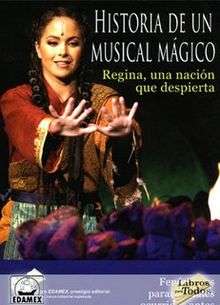Regina (play)
Regina: Un Musical Para Una Nación Que Despierta (Regina: A musical for an awaking nation) is a musical presented in the San Rafael Theater in Mexico. The musical part of the play was composed by Antonio Calvo, with lyrics by Alex Slucki, based on the novel Regina (1987) by Antonio Velasco Piña. This play was performed for the first time on March 21, 2003.
| Regina | |
|---|---|
 Poster from Regina | |
| Music | Antonio Calvo |
| Lyrics | Álex Slucki |
| Book | Antonio Velasco Piña |
History
This is the very first time Lucero performed in a play. She accepted the role that was offered by Pablo Perroni, Antonio Calvo and Renato Herrera. Lucero looked the opportunity because she rejected the role of the soap opera Amor real by the director Carla Estrada.
Synopsis
Regina was born from the union of Popocatépetl and Iztaccíhuatl volcanoes in the 50s. She was a dakini with supernatural powers inherited by the Dalai Lama, dominated the nature (the rain, the wind, the day, the night, etc.). This was discovered by Tagdra Rimpoche, her mentor, along with the Dalai Lama, upon doing some tests with objects, where she, in a natural way, would choose the same objects that the Dalai Lama had already chosen .
Musical Numbers
- Ciudad Inhumana
- Digan Por qué
- Hechizo de Luna
- Lama La
- Luz de mi verdad
- Viva Regina
- La Cárcel China
- Gloria
- No hay tiempo que perder
- Libres
- Amanecer
- Con un solo pensamiento
- Dinos por qué
- Mira con los ojos de la esencia
Performers
- Lucero
- Edgar Cañas
- Ana Regina Cuarón
- Jano
- Enrique del Olmo
- Danna Paola
- José Roberto Pisano
- Moisés Suárez
- Alejandro Villeli